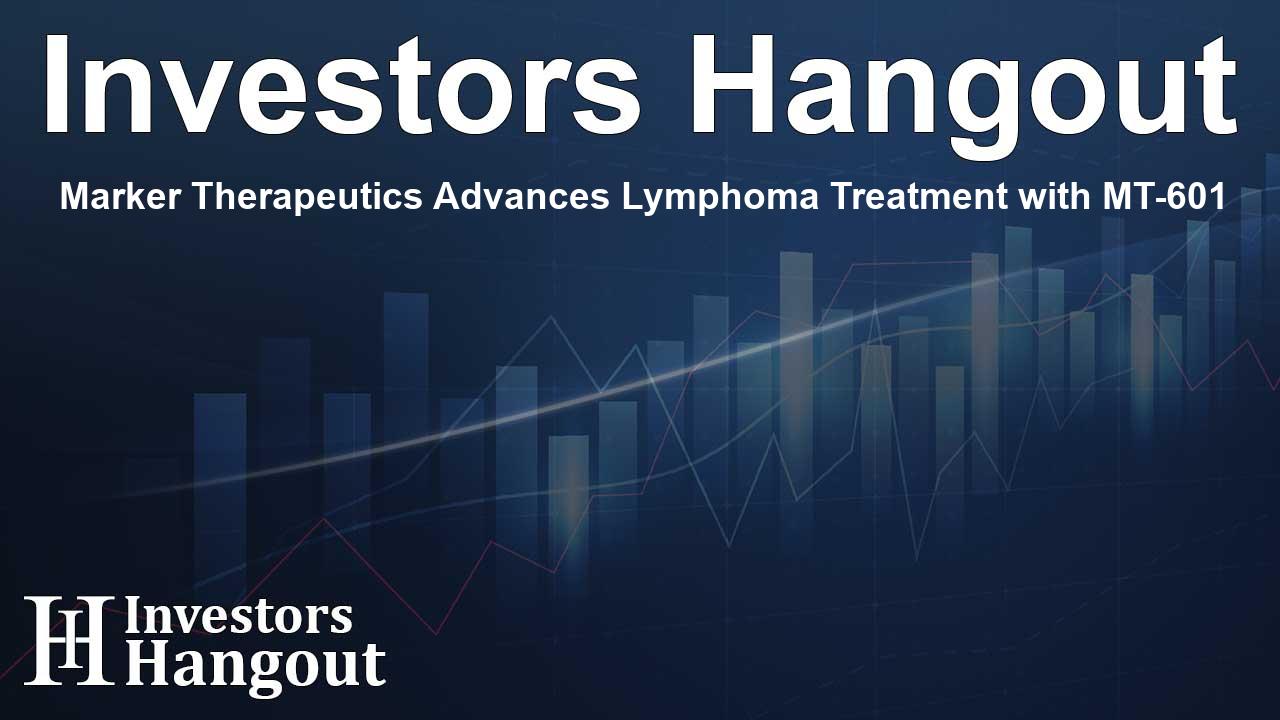Marker Therapeutics Advances Lymphoma Treatment with MT-601

Marker Therapeutics Shows Promise in Lymphoma Treatment
Marker Therapeutics (NASDAQ: MRKR) has recently shared encouraging findings from its APOLLO study, highlighting its advancements in T cell-based immunotherapies tailored for lymphoma patients. With a remarkable 79% revenue growth in the preceding twelve months, the company is dedicated to enhancing patient outcomes through innovative therapies. Investors looking for insights into Marker Therapeutics’ future can be excited about the positives presented in these recent updates.
Significant Study Results with MT-601
The APOLLO study, which encompasses nine participants across five clinical sites in the United States, achieved a noteworthy 78% objective response rate. More impressively, 44.4% of those evaluated achieved a complete response during the initial assessment. These results underline the potential efficacy of MT-601, a T cell therapy that addresses multiple tumor antigens found in lymphoma cells.
Long-Term Follow-Up and Continued Monitoring
As part of the ongoing research, long-term follow-up data is being collected for three patients, with observations stretching between six to twelve months. The aim is to evaluate the durability of the therapeutic responses and to gather comprehensive data that will further validate the treatment's safety and effectiveness. There are plans to enroll more participants to strengthen findings and establish MT-601 as a viable therapeutic option.
The Need for Innovative Lymphoma Treatments
The search for effective treatments in lymphomas remains critical, with a substantial percentage—40% to 60%—of patients experiencing relapse within a year after receiving CD19-targeting CAR-T cell therapies. Currently, there’s an evident gap in the availability of approved standard care for patients who relapse post-CD19 CAR-T treatment, which only amplifies the timing for new therapies like MT-601.
Leadership’s Perspective on MT-601
Juan Vera, M.D., the President and CEO of Marker Therapeutics, expressed his optimism regarding MT-601's capability to fulfill this significant medical requirement. The dedication to ongoing treatment for participants and the collection of extensive data will drive the further development of MT-601 aimed at patients suffering from lymphoma.
Strategic Funding to Expand Clinical Reach
In a notable development, Marker Therapeutics was awarded a significant grant of $9.5 million from the Cancer Prevention & Research Institute of Texas (CPRIT). This funding aims to support a clinical study focused specifically on their MT-601 therapy for metastatic pancreatic cancer patients. Complementing this grant is an additional $2 million secured from the NIH Small Business Innovation Research (SBIR) program, which is expected to bolster MT-601's clinical programs slated to commence in 2025.
Further Studies and Future Directions
In addition to its primary focus, MT-601 is also being investigated in another study for patients with relapsed lymphoma following CD19-CAR therapy. This versatile treatment targets six distinct tumor-specific antigens prevalent in different types of cancer, demonstrating promising results from preliminary studies conducted at City of Hope National Medical Center.
Commitment to Advancing Therapies
Marker Therapeutics continues to exhibit notable revenue growth of 79% over the last year, signaling strong market interest and confidence in their innovative therapies. However, analysts project the company may not reach profitability in the immediate future. These recent advancements showcase Marker Therapeutics' commitment to pioneering T cell-based immunotherapies and enhancing patient care through groundbreaking treatments.
Frequently Asked Questions
What are the key findings from Marker Therapeutics' lymphoma study?
The APOLLO study reported a 78% objective response rate, with 44.4% achieving a complete response among participants treated with MT-601.
What is MT-601?
MT-601 is a T cell-based therapy that targets multiple tumor antigens associated with lymphoma, offering a safer and potentially cost-effective alternative to current CAR-T therapies.
How is Marker Therapeutics funding its clinical studies?
Marker Therapeutics recently received a $9.5 million grant from CPRIT and an additional $2 million from the NIH SBIR program for its clinical studies.
What is the significance of the $9.5 million grant?
This funding will support clinical studies of MT-601, focusing on its use for metastatic pancreatic cancer patients.
What future plans does Marker Therapeutics have?
Marker Therapeutics aims to enroll additional patients for continued studies on MT-601 and expand its research on innovative therapies to combat lymphoma and other cancers.
About Investors Hangout
Investors Hangout is a leading online stock forum for financial discussion and learning, offering a wide range of free tools and resources. It draws in traders of all levels, who exchange market knowledge, investigate trading tactics, and keep an eye on industry developments in real time. Featuring financial articles, stock message boards, quotes, charts, company profiles, and live news updates. Through cooperative learning and a wealth of informational resources, it helps users from novices creating their first portfolios to experts honing their techniques. Join Investors Hangout today: https://investorshangout.com/
Disclaimer: The content of this article is solely for general informational purposes only; it does not represent legal, financial, or investment advice. Investors Hangout does not offer financial advice; the author is not a licensed financial advisor. Consult a qualified advisor before making any financial or investment decisions based on this article. The author's interpretation of publicly available data shapes the opinions presented here; as a result, they should not be taken as advice to purchase, sell, or hold any securities mentioned or any other investments. The author does not guarantee the accuracy, completeness, or timeliness of any material, providing it "as is." Information and market conditions may change; past performance is not indicative of future outcomes. If any of the material offered here is inaccurate, please contact us for corrections.